Business Law Degree Concentration - Assignment
VerifiedAdded on 2022/09/07
|5
|976
|18
AI Summary
Contribute Materials
Your contribution can guide someone’s learning journey. Share your
documents today.
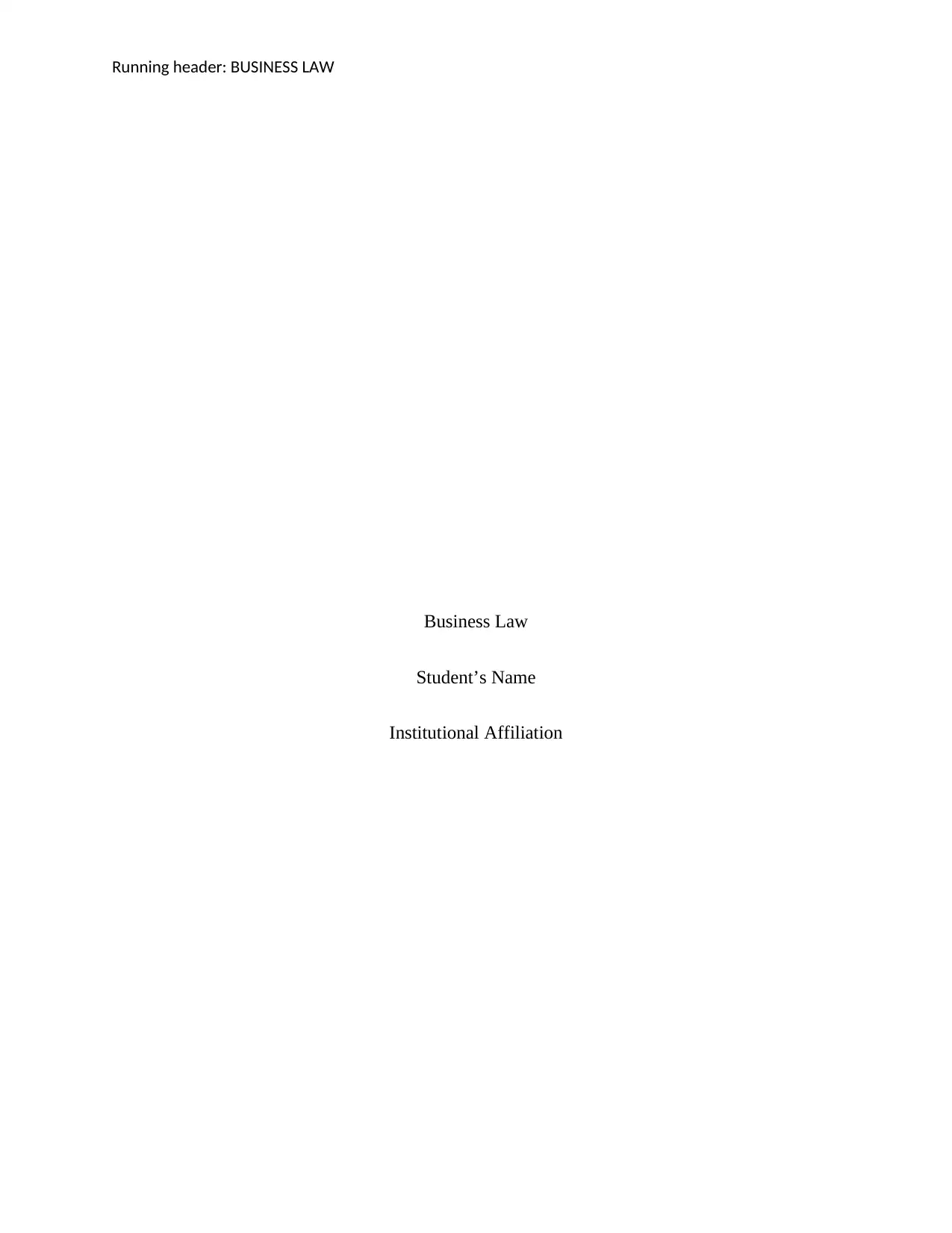
Running header: BUSINESS LAW
Business Law
Student’s Name
Institutional Affiliation
Business Law
Student’s Name
Institutional Affiliation
Secure Best Marks with AI Grader
Need help grading? Try our AI Grader for instant feedback on your assignments.
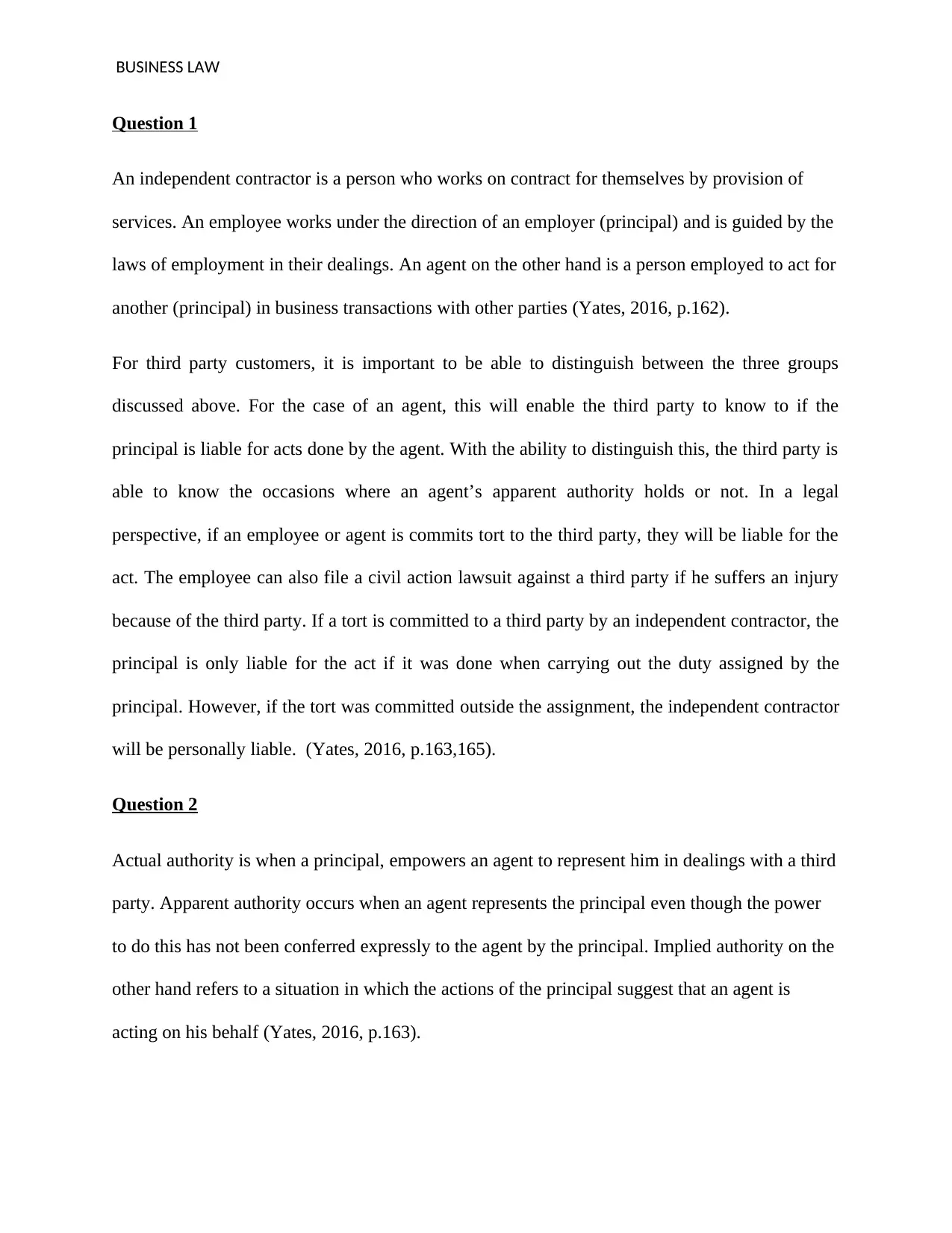
BUSINESS LAW
Question 1
An independent contractor is a person who works on contract for themselves by provision of
services. An employee works under the direction of an employer (principal) and is guided by the
laws of employment in their dealings. An agent on the other hand is a person employed to act for
another (principal) in business transactions with other parties (Yates, 2016, p.162).
For third party customers, it is important to be able to distinguish between the three groups
discussed above. For the case of an agent, this will enable the third party to know to if the
principal is liable for acts done by the agent. With the ability to distinguish this, the third party is
able to know the occasions where an agent’s apparent authority holds or not. In a legal
perspective, if an employee or agent is commits tort to the third party, they will be liable for the
act. The employee can also file a civil action lawsuit against a third party if he suffers an injury
because of the third party. If a tort is committed to a third party by an independent contractor, the
principal is only liable for the act if it was done when carrying out the duty assigned by the
principal. However, if the tort was committed outside the assignment, the independent contractor
will be personally liable. (Yates, 2016, p.163,165).
Question 2
Actual authority is when a principal, empowers an agent to represent him in dealings with a third
party. Apparent authority occurs when an agent represents the principal even though the power
to do this has not been conferred expressly to the agent by the principal. Implied authority on the
other hand refers to a situation in which the actions of the principal suggest that an agent is
acting on his behalf (Yates, 2016, p.163).
Question 1
An independent contractor is a person who works on contract for themselves by provision of
services. An employee works under the direction of an employer (principal) and is guided by the
laws of employment in their dealings. An agent on the other hand is a person employed to act for
another (principal) in business transactions with other parties (Yates, 2016, p.162).
For third party customers, it is important to be able to distinguish between the three groups
discussed above. For the case of an agent, this will enable the third party to know to if the
principal is liable for acts done by the agent. With the ability to distinguish this, the third party is
able to know the occasions where an agent’s apparent authority holds or not. In a legal
perspective, if an employee or agent is commits tort to the third party, they will be liable for the
act. The employee can also file a civil action lawsuit against a third party if he suffers an injury
because of the third party. If a tort is committed to a third party by an independent contractor, the
principal is only liable for the act if it was done when carrying out the duty assigned by the
principal. However, if the tort was committed outside the assignment, the independent contractor
will be personally liable. (Yates, 2016, p.163,165).
Question 2
Actual authority is when a principal, empowers an agent to represent him in dealings with a third
party. Apparent authority occurs when an agent represents the principal even though the power
to do this has not been conferred expressly to the agent by the principal. Implied authority on the
other hand refers to a situation in which the actions of the principal suggest that an agent is
acting on his behalf (Yates, 2016, p.163).
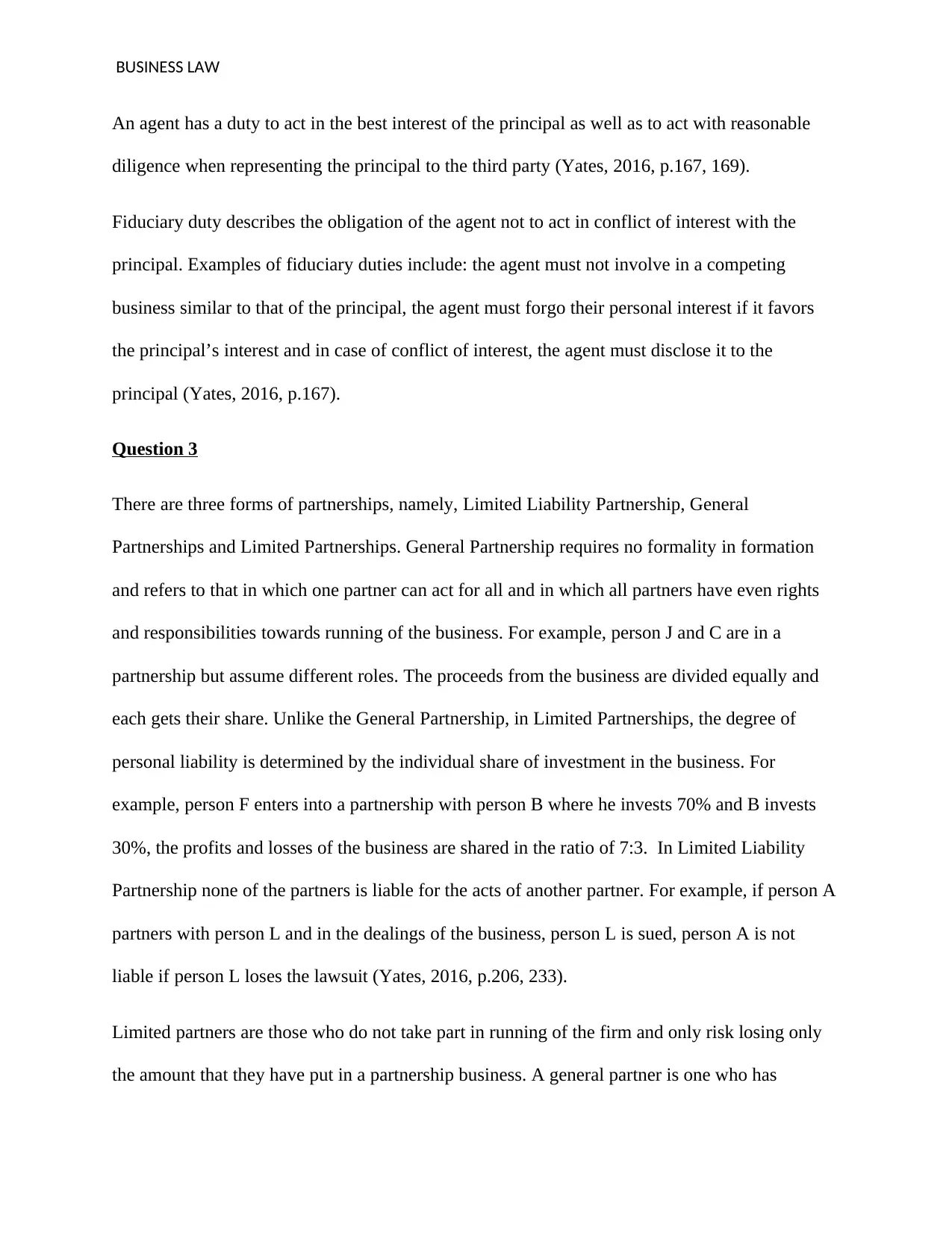
BUSINESS LAW
An agent has a duty to act in the best interest of the principal as well as to act with reasonable
diligence when representing the principal to the third party (Yates, 2016, p.167, 169).
Fiduciary duty describes the obligation of the agent not to act in conflict of interest with the
principal. Examples of fiduciary duties include: the agent must not involve in a competing
business similar to that of the principal, the agent must forgo their personal interest if it favors
the principal’s interest and in case of conflict of interest, the agent must disclose it to the
principal (Yates, 2016, p.167).
Question 3
There are three forms of partnerships, namely, Limited Liability Partnership, General
Partnerships and Limited Partnerships. General Partnership requires no formality in formation
and refers to that in which one partner can act for all and in which all partners have even rights
and responsibilities towards running of the business. For example, person J and C are in a
partnership but assume different roles. The proceeds from the business are divided equally and
each gets their share. Unlike the General Partnership, in Limited Partnerships, the degree of
personal liability is determined by the individual share of investment in the business. For
example, person F enters into a partnership with person B where he invests 70% and B invests
30%, the profits and losses of the business are shared in the ratio of 7:3. In Limited Liability
Partnership none of the partners is liable for the acts of another partner. For example, if person A
partners with person L and in the dealings of the business, person L is sued, person A is not
liable if person L loses the lawsuit (Yates, 2016, p.206, 233).
Limited partners are those who do not take part in running of the firm and only risk losing only
the amount that they have put in a partnership business. A general partner is one who has
An agent has a duty to act in the best interest of the principal as well as to act with reasonable
diligence when representing the principal to the third party (Yates, 2016, p.167, 169).
Fiduciary duty describes the obligation of the agent not to act in conflict of interest with the
principal. Examples of fiduciary duties include: the agent must not involve in a competing
business similar to that of the principal, the agent must forgo their personal interest if it favors
the principal’s interest and in case of conflict of interest, the agent must disclose it to the
principal (Yates, 2016, p.167).
Question 3
There are three forms of partnerships, namely, Limited Liability Partnership, General
Partnerships and Limited Partnerships. General Partnership requires no formality in formation
and refers to that in which one partner can act for all and in which all partners have even rights
and responsibilities towards running of the business. For example, person J and C are in a
partnership but assume different roles. The proceeds from the business are divided equally and
each gets their share. Unlike the General Partnership, in Limited Partnerships, the degree of
personal liability is determined by the individual share of investment in the business. For
example, person F enters into a partnership with person B where he invests 70% and B invests
30%, the profits and losses of the business are shared in the ratio of 7:3. In Limited Liability
Partnership none of the partners is liable for the acts of another partner. For example, if person A
partners with person L and in the dealings of the business, person L is sued, person A is not
liable if person L loses the lawsuit (Yates, 2016, p.206, 233).
Limited partners are those who do not take part in running of the firm and only risk losing only
the amount that they have put in a partnership business. A general partner is one who has
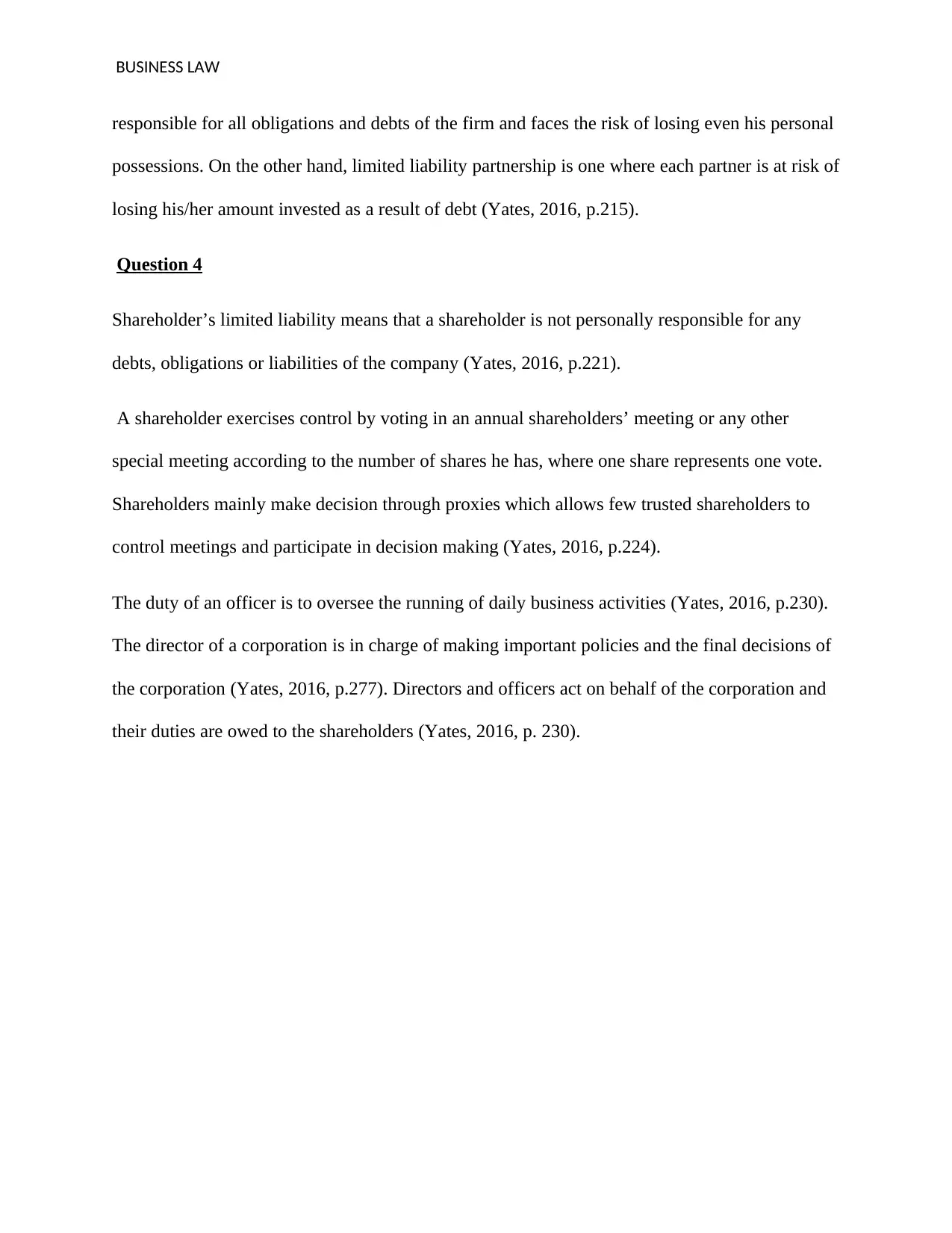
BUSINESS LAW
responsible for all obligations and debts of the firm and faces the risk of losing even his personal
possessions. On the other hand, limited liability partnership is one where each partner is at risk of
losing his/her amount invested as a result of debt (Yates, 2016, p.215).
Question 4
Shareholder’s limited liability means that a shareholder is not personally responsible for any
debts, obligations or liabilities of the company (Yates, 2016, p.221).
A shareholder exercises control by voting in an annual shareholders’ meeting or any other
special meeting according to the number of shares he has, where one share represents one vote.
Shareholders mainly make decision through proxies which allows few trusted shareholders to
control meetings and participate in decision making (Yates, 2016, p.224).
The duty of an officer is to oversee the running of daily business activities (Yates, 2016, p.230).
The director of a corporation is in charge of making important policies and the final decisions of
the corporation (Yates, 2016, p.277). Directors and officers act on behalf of the corporation and
their duties are owed to the shareholders (Yates, 2016, p. 230).
responsible for all obligations and debts of the firm and faces the risk of losing even his personal
possessions. On the other hand, limited liability partnership is one where each partner is at risk of
losing his/her amount invested as a result of debt (Yates, 2016, p.215).
Question 4
Shareholder’s limited liability means that a shareholder is not personally responsible for any
debts, obligations or liabilities of the company (Yates, 2016, p.221).
A shareholder exercises control by voting in an annual shareholders’ meeting or any other
special meeting according to the number of shares he has, where one share represents one vote.
Shareholders mainly make decision through proxies which allows few trusted shareholders to
control meetings and participate in decision making (Yates, 2016, p.224).
The duty of an officer is to oversee the running of daily business activities (Yates, 2016, p.230).
The director of a corporation is in charge of making important policies and the final decisions of
the corporation (Yates, 2016, p.277). Directors and officers act on behalf of the corporation and
their duties are owed to the shareholders (Yates, 2016, p. 230).
Secure Best Marks with AI Grader
Need help grading? Try our AI Grader for instant feedback on your assignments.
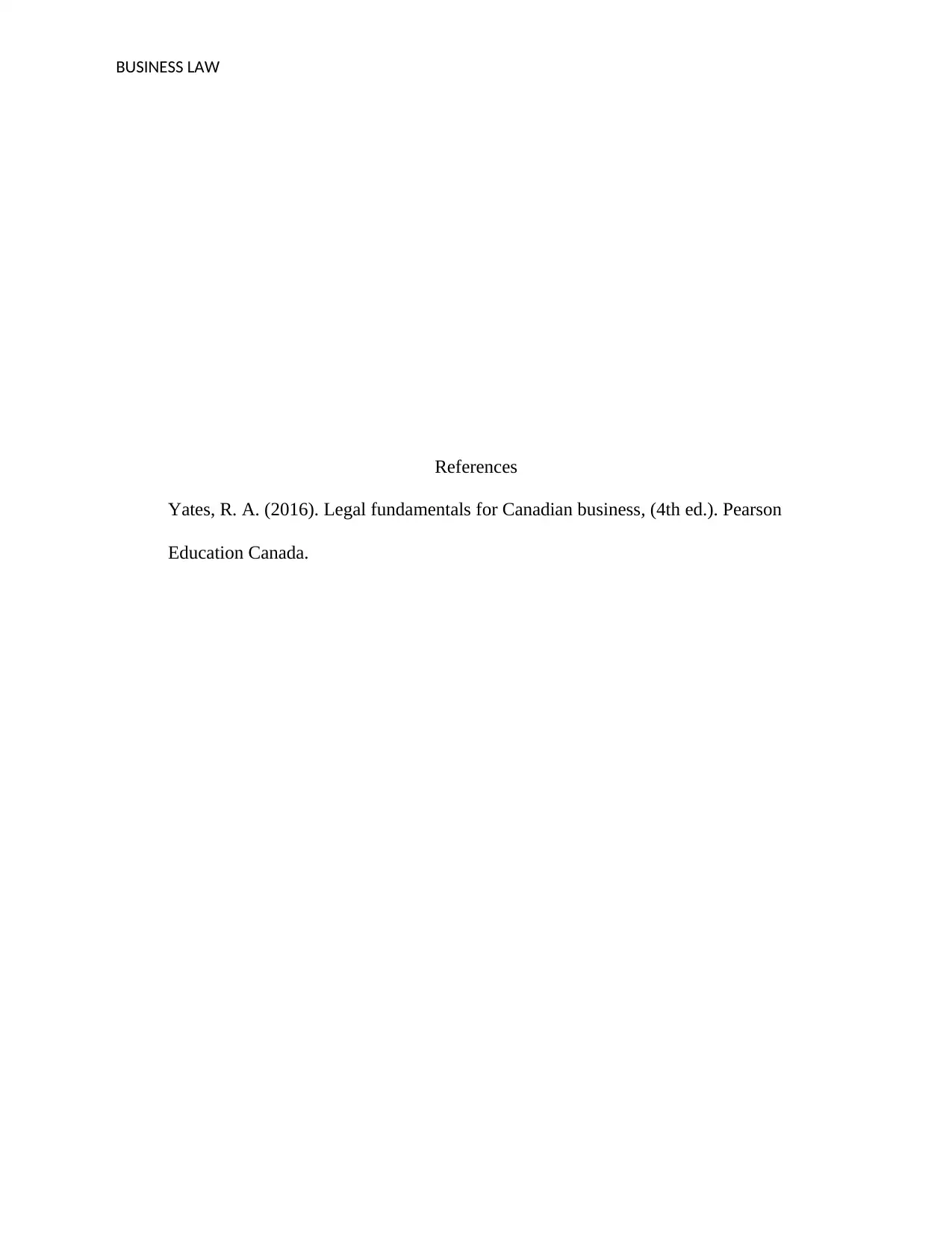
BUSINESS LAW
References
Yates, R. A. (2016). Legal fundamentals for Canadian business, (4th ed.). Pearson
Education Canada.
References
Yates, R. A. (2016). Legal fundamentals for Canadian business, (4th ed.). Pearson
Education Canada.
1 out of 5
Related Documents
Your All-in-One AI-Powered Toolkit for Academic Success.
+13062052269
info@desklib.com
Available 24*7 on WhatsApp / Email
![[object Object]](/_next/static/media/star-bottom.7253800d.svg)
Unlock your academic potential
© 2024 | Zucol Services PVT LTD | All rights reserved.





